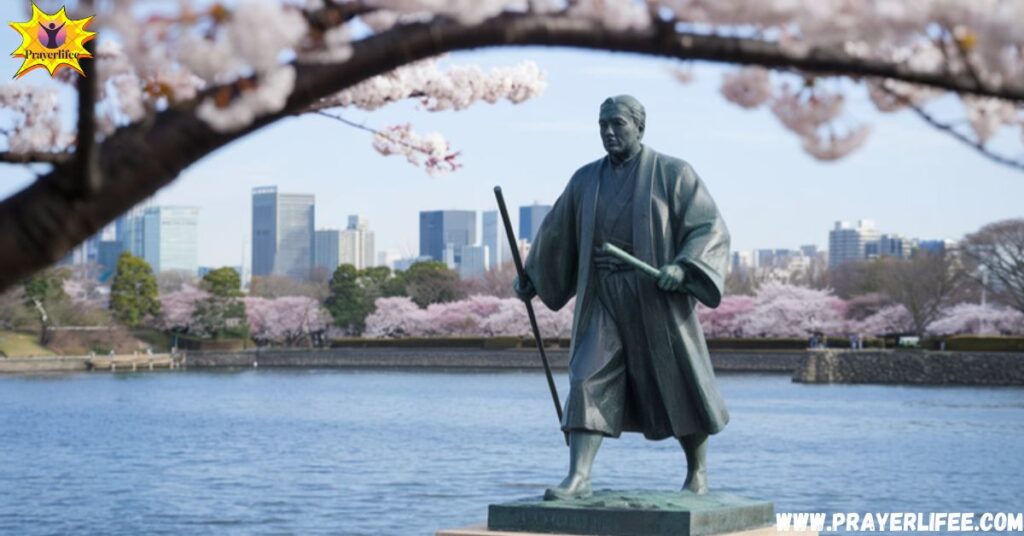The True Meaning of Anjin refers to a title used in Japanese culture for a trusted navigator or pilot. It signifies someone with great leadership skills and wisdom. The term also carries deep respect and honor in Japanese society.
Ever wondered how a simple word can bridge two cultures? Anjin is more than just a title; it’s a symbol of guidance and trust. It’s connected to historical figures and important events that shaped history.
The title Anjin became famous through William Adams, an English navigator. He earned the title Anjin-san in Japan during the 1600s. This word continues to represent leadership, trust, and cross-cultural exchange.
What is “Anjin”?

The word Anjin refers to a navigator or pilot in Japanese. It is often used to describe a person who guides or leads others, particularly in maritime contexts. However, Anjin holds much more significance than just a simple title. It is a symbol of leadership, wisdom, and trust. In Japan, the term carries a sense of respect, as it is given to individuals who are seen as highly competent, reliable, and capable of leading others safely through challenges.
Historically, Anjin became especially well-known through the story of William Adams, an Englishman who was shipwrecked on the coast of Japan in the early 1600s. His expertise as a navigator earned him the title Anjin-san, which marked him as a trusted advisor to Shogun Tokugawa Ieyasu. His story represents the exchange of knowledge and culture between East and West, and it also symbolizes the deep trust and respect the Japanese had for someone with great navigational skills.
Anjin in Historical Context
The story of William Adams and the rise of the term Anjin begins in the early 1600s. In 1600, Adams, an English navigator, was shipwrecked on the shores of Japan after his ship became lost during a journey. Upon his arrival, he quickly gained the trust of the Japanese Shogun Tokugawa Ieyasu. The Edo period in Japan was a time of relative peace and isolation from the rest of the world, and the Shogunate saw great value in foreign expertise, particularly in navigation and shipbuilding.
Adams’ skills as a navigator and his knowledge of European shipbuilding techniques made him a crucial asset to the Shogunate. In recognition of his abilities and the trust the Shogun placed in him, Adams was given the title Anjin, which means “the pilot” or “the trusted navigator”. This title marked Adams as an essential figure in Japanese history.
Cultural Significance of Anjin
In Japanese culture, the title Anjin holds deep significance. It represents more than just a navigator—it is a symbol of trust and leadership. To be called Anjin was a great honor, as it suggested that the person had earned the respect of both the Shogunate and the people. The role of an Anjin was not simply to guide ships or provide technical knowledge; it was also to offer wisdom in strategic decisions, much like the role of a samurai.
The symbolism of Anjin is tied to the Japanese values of honor, duty, and discipline. In fact, the role of Anjin is closely associated with the samurai tradition. Samurai were not only warriors; they were also advisors and strategists, guiding both political and military decisions.
The Anjin title, then, carries echoes of samurai culture, with its emphasis on leadership and guiding others with wisdom and honor. This deep cultural significance of Anjin extends beyond just the Edo period and continues to resonate with modern interpretations of leadership and trust in Japan.
Read More: Family’s or Families’ or Families? A Simple Guide
The Samurai Connection
The term Anjin has strong ties to samurai culture. In feudal Japan, the samurai were not only skilled warriors but also esteemed leaders and strategists. The Anjin title embodies many of the same qualities valued in samurai culture, particularly the ability to lead, guide, and make important decisions under pressure.
Just like the samurai, an Anjin was expected to demonstrate discipline, wisdom, and the capacity to navigate not just physical challenges, but also complex social and political situations. The title reflects the samurai code of Bushido, which emphasizes loyalty, honor, and self-control. For William Adams, being granted the title of Anjin meant he had earned a place within the elite circle of trusted advisors, a role traditionally held by the samurai. This connection between Anjin and the samurai underscores the deep respect for leadership and the importance of guiding others through turbulent times.
Anjin in Literature and Popular Culture

The story of William Adams and his connection to the title Anjin has been immortalized in literature and popular culture, most notably in the novel Shogun by James Clavell. This historical fiction, set in the early 1600s, tells the tale of Adams’ journey in Japan, where he earns the title of Anjin-san and becomes a trusted advisor to the Shogun. The novel and its subsequent miniseries helped introduce the term Anjin to a global audience and cemented its place in the popular imagination.
In literature and film, Anjin is often portrayed as a symbol of cross-cultural exchange. The title reflects not only Adams’ leadership but also the broader theme of East-West relations. It emphasizes the importance of understanding, respect, and cooperation between cultures, making Anjin a powerful metaphor for international diplomacy and collaboration.
The Anjin Connection in the Samurai Culture
The connection between Anjin and the samurai culture is more than just symbolic. In many ways, the Anjin title was reflective of the samurai’s role as guides and advisors. The samurai were revered for their ability to lead with honor, and the title of Anjin was given to those who demonstrated similar qualities.
William Adams, despite being a foreigner, was seen as a samurai in spirit because of his strategic thinking and leadership in Japan. He used his knowledge to help Shogun Tokugawa Ieyasu make crucial decisions about naval power and international relations, which played a key role in the Edo period’s success. The idea of Anjin as a guide and strategist closely mirrors the samurai code, where honor and leadership were paramount.
Modern Usage and Adaptations of “Anjin”
While the title Anjin is not commonly used in everyday language in modern Japan, its legacy still lives on. Today, the term Anjin is occasionally used in business and international relations to symbolize leadership and strategic thinking. Companies may adopt the term Anjin in their branding to evoke qualities of trustworthiness and reliable guidance.
The influence of Anjin extends beyond Japan as well. The cross-cultural significance of Anjin continues to make it a powerful symbol of cooperation and understanding between cultures, particularly in international diplomacy and business.
The Linguistic Meaning of “Anjin”
The word Anjin is composed of two kanji characters: 安 (an), meaning peace or safe, and 寝 (jin), meaning sleep or rest. Together, they convey a sense of safety, peace, and stability—a leader who guides others toward calm and safety, whether on a ship or through political decisions.
This linguistic meaning of Anjin reinforces the idea of guiding others through difficult or uncharted waters. The word itself embodies qualities that are not only important for a navigator but for anyone in a leadership position. It suggests a person who is trusted to lead with wisdom and responsibility.
Key Figures Associated with “Anjin”
The most famous figure associated with the term Anjin is William Adams. His journey to Japan and his eventual rise to the position of Anjin-san is a testament to the power of cross-cultural exchange. However, there are other figures who may be connected to the title in symbolic ways, especially in the context of leadership and international relations.
Adams’ legacy continues to influence the way Japan and the West view each other, especially in terms of trust, collaboration, and shared knowledge.
The Impact of “Anjin” Today
The legacy of Anjin endures in modern society, not only in Japan but also globally. The Anjin story has become a symbol of trust and leadership that transcends national boundaries. Today, the term still resonates as a powerful reminder of the importance of cross-cultural understanding and strategic collaboration.
The figure of William Adams and his role as Anjin in Japan’s history continues to inspire leaders and diplomats around the world. His ability to bridge cultures and navigate both physical and political challenges serves as a model for contemporary leadership.
“Anjin” in the Context of International Relations

In the context of international relations, Anjin symbolizes the exchange of ideas, technology, and culture. Through William Adams, Anjin became a bridge between the East and the West, facilitating a deeper understanding and cooperation between two very different worlds. This historical role of Anjin continues to be a reference point in discussions of global diplomacy and cultural exchange.
Anjin as a Symbol of Honor and Trust
The role of Anjin has always been closely tied to the concept of honor and trust. In both historical and modern contexts, being called Anjin means that a person has earned the respect and confidence of others. Whether in Japanese history, business, or international diplomacy, Anjin remains a powerful symbol of reliable leadership and strategic guidance.
Conclusion
The term Anjin carries with it a rich history, one that spans from its origins in Japanese maritime history to its modern significance in global diplomacy. It is a symbol of leadership, trust, and cross-cultural exchange that continues to resonate today. Whether in the context of the Edo period, samurai culture, or international relations, Anjin remains a powerful reminder of the value of guiding others with wisdom and honor.

